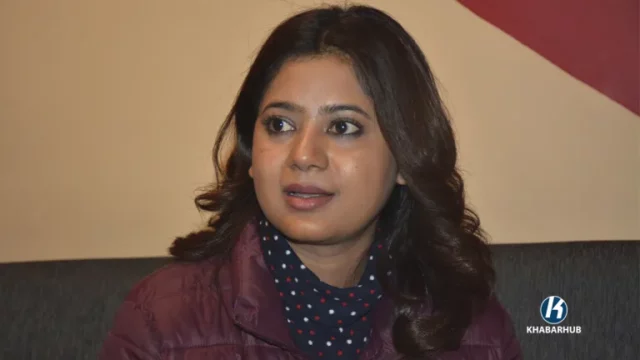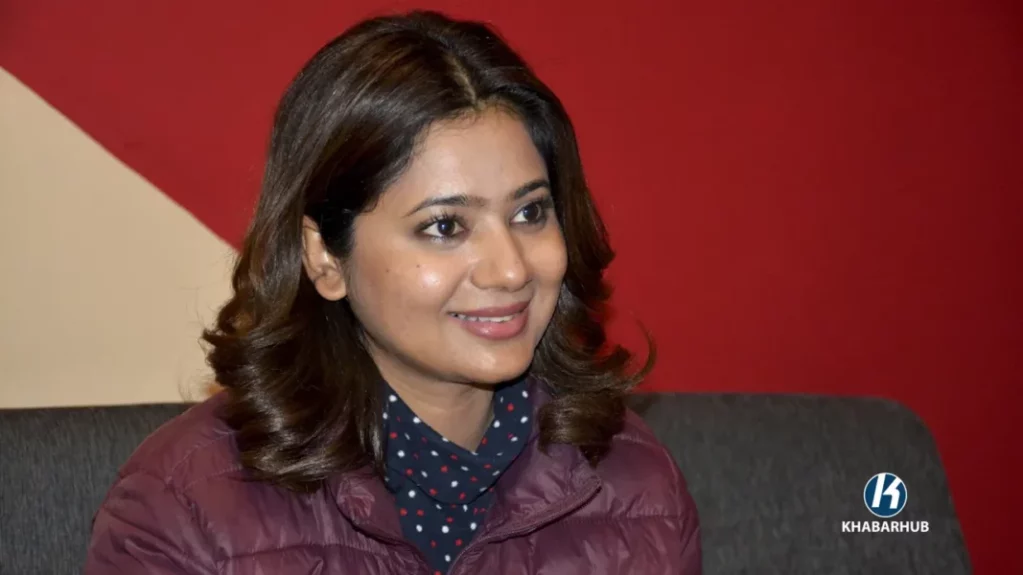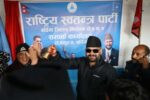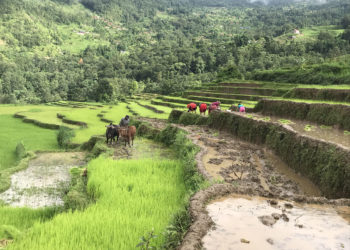KATHMANDU: In the realm of Nepali cinema, Keki Adhikari is celebrated for her multifaceted talents—acting prowess, distinctive voice, intelligence, and an enchanting ‘cute look.’
Beyond her on-screen presence, she has ventured into production, solidifying her position as a versatile artist and a well-read heroine.
What sets Keki apart is her deliberate choice to stay away from her father’s directorial projects.
Surprisingly, her father, Badri Adhikari, only discovered her theatrical endeavors later, despite being a prominent film director himself.
Keki’s journey into the limelight took an unexpected turn, as she candidly shared with Khabarhub the period when she distanced herself from her parents upon deciding to pursue acting, even going so far as to pass the MBBS exam in the process.
Little did she know that this discreet endeavor would serve as the gateway to a plethora of opportunities, marking the beginning of her impactful journey in the entertainment industry.
Her foray into films was initially through dance, commercials, and music videos.
While it was the film ‘Masaan’ that truly showcased her talents to a broader audience, she had already captured the admiration of producers and viewers alike with her artistic flair.
In a revealing interview, Keki disclosed that her commitment to acting deepened after establishing her presence in the industry.
Her story, transitioning from a stellar student to a leading lady, serves as an inspiring narrative for those aspiring to tread the path of showbiz.
From top of the class to center stage: Keki’s early years
Keki, born in Bauddha in Kathmandu, reflects on her formative years.
Her father, a director and teacher, juggled roles in the challenging world of stage performances.
Keki spent her childhood in a school hostel, where her father was employed, alongside her brother.
Recalling her early academic achievements, Keki reminisces, “During our youth, my father was still navigating the challenges of the stage. He supplemented his income by teaching to support the family.”
After a few years, Keki’s father established a new school in Arubari, shaping her upbringing in its nurturing environment.
Despite consistently securing the top spot in school, Keki felt the weight of expectations from peers who suspected her of having prior knowledge of exam questions.
“I faced accusations from friends who believed I had access to the question paper before exams,” she shares.
Undeterred, Keki excelled in the SLC exam, achieving the highest rank—a rare feat in a country with only around 100 individuals receiving such distinctions at the time.
While pursuing science in Plus Two, Keki’s path veered toward the stage as she prepared for the challenging MBBS examinations.
Her unconventional journey from academic excellence to becoming a prominent character heroine is a testament to her resilience and determination, offering inspiration to those charting a course in the entertainment industry.
Keki’s Hidden Journey
Keki, renowned in the film industry for her versatility, recalls a time when the prospect of becoming a child actor seemed distant due to her father’s concerns about academic priorities.
Despite his active involvement in the film sector and ownership of a school, her father refrained from allowing her to partake in the world of acting, fearing it might hamper her studies.
The disappointment lingered as Keki learned that her friends had ventured into the world of shooting, leaving her feeling excluded.
She shares, “When my friends returned from the shoot, recounting tales with Nikhil Upreti, I felt a pang of discomfort. I used to cry with my mother because my father did not take me to the shooting.”
Overwhelmed by fear, Keki hesitated to express her desire to participate in shootings.
She speculates, “Perhaps he worried that his daughter would encounter the same struggles he faced in the field when he began his journey into the world of shooting.”
A turning point after Plus 2
Post Plus 2 Science, Keki embarked on MBBS preparation classes, dividing her time between rigorous study sessions in the morning and leisure in the afternoon.
During this period, an advertisement for the dance competition ‘Ghintang’ caught her attention in the newspaper.
Driven by her childhood passion for dance, she decided to participate.
Little did she anticipate that this decision would set the stage for her remarkable journey.
While competing on television, Keki caught the eye of the ‘Thomson Nepal’ team, actively seeking talent for an advertisement in collaboration with Nepal Television.
Recounting the audition process, Keki reflects on the initial hesitation owing to her lack of modeling background and the unique dialogue presented to her during the audition.
Despite her apprehensions, she impressed the judges with her versatility, showcasing the dialogue in ten different ways.

Unaware of industry norms, she agreed to come with a portfolio, only realizing later that she was unfamiliar with the concept.
Yet, her spontaneity and talent landed her on the shortlist.
Despite facing challenges in preparing a portfolio, she candidly disclosed the necessary details during the team’s call, leading to a successful photo shoot that secured her a role in the advertisement.
However, Keki chose to keep her newfound success hidden from her family, fearing it might jeopardize her academic pursuits.
The revelation to her father was met with mixed reactions. Her mother’s response, citing concerns about the impact of her music video involvement on academics, added a layer of complexity to Keki’s decision.
Little did she know that this discreet endeavor would serve as the gateway to a plethora of opportunities, marking the beginning of her impactful journey in the entertainment industry.
Stepping into the Spotlight
Director Prashanna Paudel’s unexpected proposition in the Nepal Television canteen marked the commencement of Keki’s journey into the realm of music videos.
However, skepticism clouded her initial response, dismissing the offer as mere teasing.
It was only after a second offer that she realized the genuine opportunity at hand.
Recalling those early days, Keki admits, “I was apprehensive that if my father discovered my involvement, he might forbid me from working. So, I confided only in my mother, carefully scheduling shoots to ensure I returned home by 6 o’clock.”
Keki’s second music video, “Aha, Banma Phulyo Phulai Phula,” featuring Anju Pant, catapulted her into the limelight, earning her recognition as a sought-after model.
The media sector buzzed with discussions about the emerging talent, leading to a flood of subsequent offers.
Despite her growing success, Keki continued to harbor fears of her father’s disapproval.
The thought that her father might hinder her entry into the film industry, fearing a decline in her studies, weighed heavily on her mind.
Reflecting on that uncertain period, she shares, “I was afraid of the moment when my father would find out. If he said no, it would mean a complete halt to my work in this field.”
Amidst this dilemma, a film offer presented itself. With no avenue to disclose it at home, Keki grappled with conflicting emotions.
“I even contemplated abandoning the MBBS exam, but there was no way I could embark on a film without addressing this at home,” she confesses.
Keki vividly recalls, “There is bitterness in the house. Four people in the house, all four have not spoken to anyone. The house felt cold. I cannot describe the condition of the house at that time.”
During this time, Keki crossed paths with model Rima Bishwakarma and actress Benisa Hamal, forming connections that would play a role in shaping her future in the industry.
The pivotal moment arrived with the release of Keki’s debut film, ‘Swar’.
Faced with the decision of whether to inform her father and forgo the MBBS exam, Keki sought guidance from director Prasanna Paudel.
Choosing to prioritize her burgeoning film career, she made the daring choice not to pursue the medical field.
The revelation to her father was met with mixed reactions. Her mother’s response, citing concerns about the impact of her music video involvement on academics, added a layer of complexity to Keki’s decision.
As Keki opened up about her decision to forsake MBBS, she recounts, “He stopped talking to me instead of preventing me from doing a film.”
This marked a poignant moment in Keki’s journey, as she embraced her chosen path in the world of cinema, navigating the complexities of familial expectations and personal aspirations.
Balancing Films, Family, and Unforeseen Challenges
The dynamics within Keki’s household underwent a seismic shift when her mother granted permission for her to feature in a music video.
Concerned about the potential impact on her daughter’s studies, this decision inadvertently led to a period of bitterness and strained relationships.
The film’s success was followed by ‘Masaan,’ which not only won over audiences but also earned the admiration of her father, director Badri Adhikari.
Keki vividly recalls, “There is bitterness in the house. Four people in the house, all four have not spoken to anyone. The house felt cold. I cannot describe the condition of the house at that time.”
Seeking to reconcile, Keki negotiated with her father, earning permission to work and securing a contract for the film ‘Swar.’
This compromise required her to step away from screen world, which she agreed to in the interest of her studies.
The transition to the film industry presented a dilemma about her father’s expectations regarding her academic pursuits.
In response to inquiries about her preferred field of study, Keki, fueled by fear, blurted out “BIM,” a subject that was unfamiliar at the time but was pursued without a concrete plan.
Adhering to her promise, Keki, over the span of 13 years, not only excelled in her film career, delivering numerous hits, but also earned an MBA.
As a producer of two films, including the upcoming “Boksiko Ghar,” she has demonstrated her multifaceted talents.
Reflecting on her early reluctance to embrace the role of a heroine, Keki admits that she kept her stage performances a secret until her second film gained popularity.
She reminisces, “I used to go to college by riding a micro.”
The realization that she was now addressed as a ‘heroine’ made her uncomfortable, as she had never envisioned a career in the film industry.
“I never thought I would work in this field. This was not my wish,” she shares.
Reflecting on the evolving role of actresses in the film industry after marriage, Keki notes the positive trend set by leading actresses like Karisma Manandhar.
The initial reluctance to proudly proclaim her involvement in films persisted even as some labeled her a heroine.
The turning point in her film career came with the second film, ‘I Am Sorry,’ where she starred opposite Aryan Sigdel.
Partnering with Aryan, who was at the pinnacle of his career, marked another success for Keki.
The film’s success was followed by ‘Masaan,’ which not only won over audiences but also earned the admiration of her father, director Badri Adhikari.
Playing the character of ‘Helen’ in ‘Masaan’ at the age of 21 presented unique challenges, portraying a role a decade her senior.
The film, based on an old story, required Keki to navigate intricate dialogues.
Reflecting on this experience, she acknowledges, “‘Masaan’ established me as an artist. It is the most difficult character I have portrayed to date.”
The film proved pivotal in Keki’s career, prompting her decision to take acting seriously.
Her father’s acknowledgment of her artistic aspirations followed, with him expressing, “After ‘Masaan,’ now you can make your own decisions, you can work.”
This marked a significant milestone in Keki’s journey, where her dedication to her craft and determination to overcome challenges paved the way for a flourishing career in the Nepali film industry.
Beyond magazine glamour and cinematic challenges
In an illustrious career spanning over 60 films, Keki continues her journey, navigating the diverse landscape of Nepali cinema with grace and resilience.
Despite the common excitement artists feel when their photos grace the pages of magazines, Keki, in an interesting departure from the norm, recalls her initial indifference to the experience.
The memory of her first photo shoot for a magazine after entering the film industry is tinged with a sense of detachment.
She explains, “Before I became an artist, my photo used to appear on the first page of the magazine in the advertisement of ‘Close Up.’ I was not attracted to photos in such a magazine.”
Her disinterest in magazine photos stems from her limited readership of “Rang” magazine.
While many artists find pride and success in these visual representations, Keki’s focus remains steadfast on her craft rather than the glossy pages of publications.
Despite the controversy, the film secured investments and, despite facing challenges, managed to turn a profit both domestically and internationally.
Amidst her cinematic endeavors, Keki, who got married in 2022, shares candid insights into her personal life.
Contrary to societal expectations, she reveals, “I did not plan to ‘become a mother’ for a year after getting married.”
She embraces the current phase of her life, acknowledging that while there is an emptiness, the allure of something new will inevitably surface.
Balancing her personal and professional life, Keki foresees being engrossed in work for the next year or two.
Reflecting on the evolving role of actresses in the film industry after marriage, Keki notes the positive trend set by leading actresses like Karisma Manandhar.
She emphasizes, “From Karisma didi’s time till now, it has been established that marriage does not matter if you are a good artist.”
The acceptance of actresses being married and having children as openly embraced situations is a testament to the evolving mindset within the industry.
Addressing a controversy surrounding her first film as a producer, ‘Kohalpur Express,’ released in 2018, Keki clarifies that while there may be a name in the script, the story is not entirely the writer’s.
She acknowledges the team’s responsibility and her moral obligation as a producer.
Despite the controversy, the film secured investments and, despite facing challenges, managed to turn a profit both domestically and internationally.
The film’s success attests to Keki’s determination and resilience in navigating the complexities of film production in the Nepali industry.









Comment